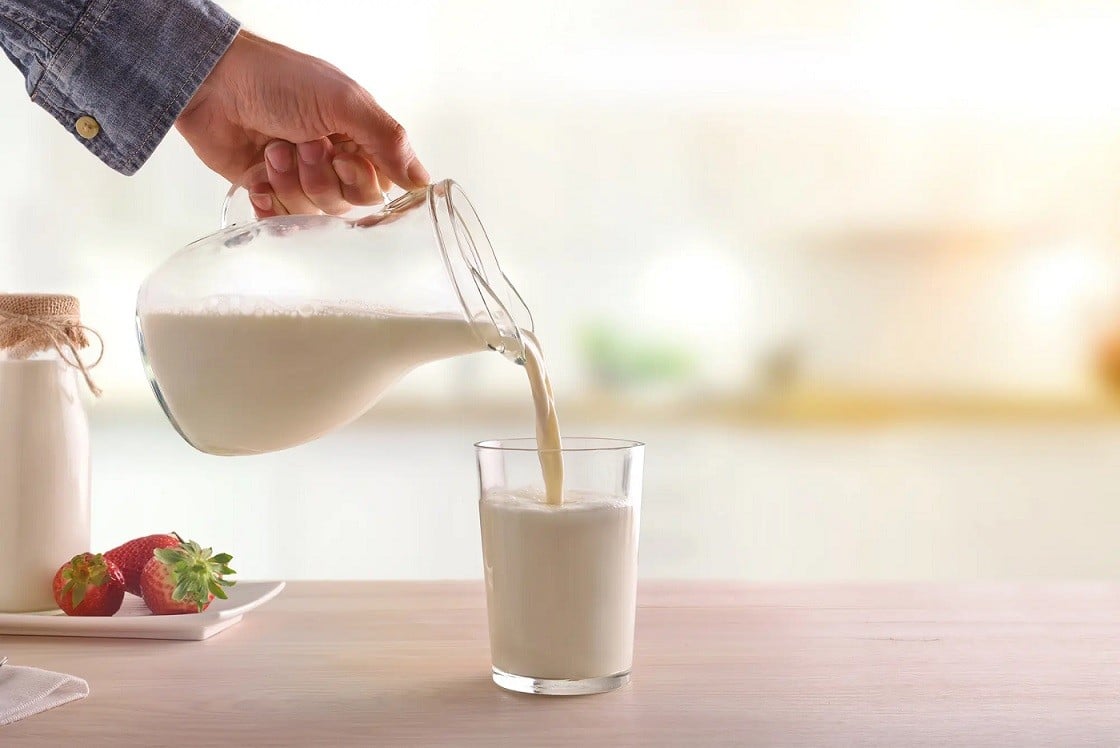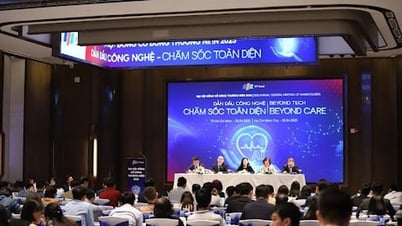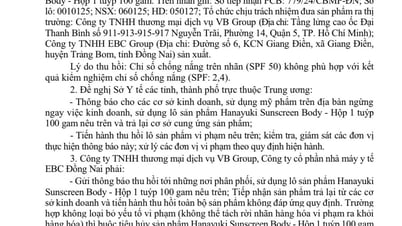Middle-aged and elderly people should regularly eat whole grains, fresh fish, eggs, milk, lean meat... to maintain health.
 |
| To drink milk to supplement calcium for bones, the elderly can choose low-fat or skim milk. (Illustration - Source: Shutterstock) |
Whole grains
As we age, intestinal function gradually weakens, making it easy to get constipated. Dietary fiber can promote intestinal motility, thereby alleviating constipation symptoms. Whole grains are rich in dietary fiber, which can promote intestinal motility and prevent constipation.
Whole grains are also rich in B vitamins and minerals such as vitamin B1, vitamin B2, magnesium, zinc... These nutrients are important for maintaining cardiovascular health, enhancing immunity, and promoting metabolism.
The nutrients in whole grains are more easily absorbed and used by the body than those in refined grains.
However, because whole grains are rich in fiber, eating too much can cause digestive discomfort. You should gradually increase the amount of whole grains you eat to allow your gut to adjust.
Fresh fish
Fish is a source of high-quality protein. In addition, fish is rich in vitamin A and vitamin D, calcium, phosphorus, selenium... which are important for maintaining vision, bone and tooth health. Unsaturated fatty acids such as Omega-3 in fish help improve brain function, improve memory and cognition, and prevent Alzheimer's disease.
Middle-aged and elderly people should eat a lot of fish, especially deep-sea fish rich in unsaturated fatty acids such as salmon, cod, tuna... However, due to the decline in body functions of middle-aged and elderly people, their ability to digest and absorb is relatively weak.
Therefore, it is necessary to process fish based on easy-to-digest methods such as steaming and stewing; avoid frying.
Egg
Eggs are rich in high-quality protein, which is important for middle-aged and elderly people to maintain muscle strength, promote tissue repair, and enhance immunity. Eggs are also rich in vitamins and minerals such as vitamin A, vitamin D, vitamin B12, iron, zinc, etc.
In addition, egg yolks contain abundant lecithin and choline, which are beneficial for healthy brain function. Lecithin can promote the synthesis of neurotransmitters, improve memory and cognitive ability. Choline is the raw material for the production of acetylcholine, which plays an important role in the transmission of nerve impulses.
However, middle-aged and elderly people should consume eggs in moderation because egg yolks contain a large amount of cholesterol, so people with high blood lipid levels should control their intake.
In general, these people should only consume one egg per day.
Soy products
Soybean, mung bean, pea, broad bean and other legume dishes are rich in high quality protein, vegetable fiber, vitamins and minerals, very good for health.
For middle-aged and elderly people, protein intake is especially important to maintain muscle mass and enhance immunity. Compared with animal protein, soy products are rich in vegetable protein, do not contain cholesterol and saturated fat, and are more beneficial to cardiovascular health.
As we age, intestinal motility slows down, making digestive problems more likely. Dietary fiber can promote intestinal motility, improve digestive function, and prevent constipation and intestinal diseases.
In addition, soy products are also rich in minerals such as calcium, iron, and zinc, which help maintain bone density, blood circulation, and enhance immunity in middle-aged and elderly people.
At the same time, soy products are also rich in vitamins, especially vitamin B complex, which helps promote metabolism and nervous system health.
Lean
Lean meat is a source of high-quality protein. Although the body's protein needs are relatively low in the elderly, protein is still very important in maintaining muscle health, bones, the immune system...
Protein in lean meat contains amino acids essential to the human body, is easily absorbed and used by the body, helps maintain muscle strength and immune function in the elderly.
Furthermore, lean meat is rich in minerals such as iron and zinc. These minerals are easily deficient in the elderly and are important for maintaining normal physiological functions.
For example, iron is a component of hemoglobin, which can prevent anemia, while zinc helps maintain a healthy immune and nervous system.
Lean meat also contains B vitamins, such as vitamin B12, which helps maintain a healthy nervous system in the elderly. At the same time, vitamin B also contributes to improving metabolism and promoting good health for the elderly.
Choose lean meats such as lamb and beef, try to use healthy cooking methods such as steaming, boiling, stewing... and reduce frying and stir-frying.
Milk
As we age, bone density gradually decreases, making older people more susceptible to fractures and other problems. Drinking plenty of milk can supplement calcium, increase bone strength and flexibility, and prevent osteoporosis.
Milk contains vitamin D, which helps promote calcium absorption. Milk also contains high-quality protein, which is important for maintaining muscle in the elderly and preventing muscle atrophy.
Seniors can choose low-fat or skim milk to reduce their fat intake.
Source




![[Photo] Readers line up to visit the photo exhibition and receive a special publication commemorating the 135th birthday of President Ho Chi Minh at Nhan Dan Newspaper](https://vphoto.vietnam.vn/thumb/1200x675/vietnam/resource/IMAGE/2025/5/17/85b3197fc6bd43e6a9ee4db15101005b)
![[Photo] Prime Minister Pham Minh Chinh chairs meeting on science and technology development](https://vphoto.vietnam.vn/thumb/1200x675/vietnam/resource/IMAGE/2025/5/17/ae80dd74c384439789b12013c738a045)
![[Photo] More than 17,000 candidates participate in the 2025 SPT Competency Assessment Test of Hanoi National University of Education](https://vphoto.vietnam.vn/thumb/1200x675/vietnam/resource/IMAGE/2025/5/17/e538d9a1636c407cbb211b314e6303fd)
![[Photo] Nearly 3,000 students moved by stories about soldiers](https://vphoto.vietnam.vn/thumb/1200x675/vietnam/resource/IMAGE/2025/5/17/21da57c8241e42438b423eaa37215e0e)

































































































Comment (0)